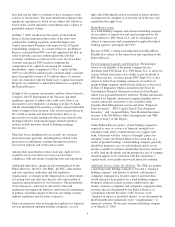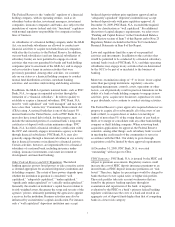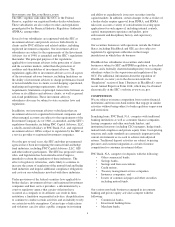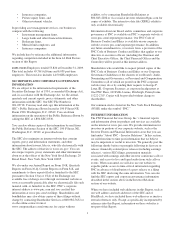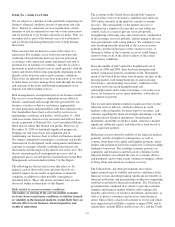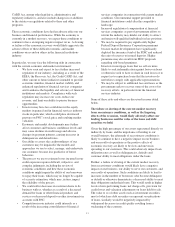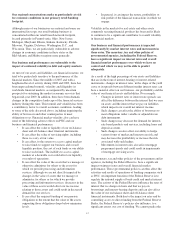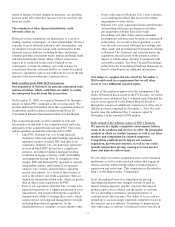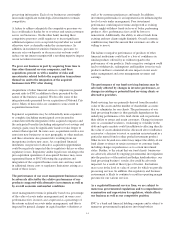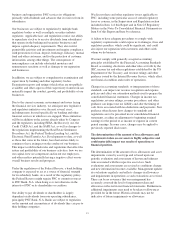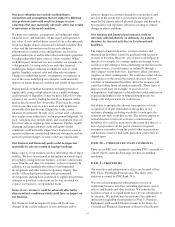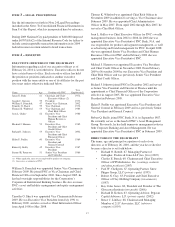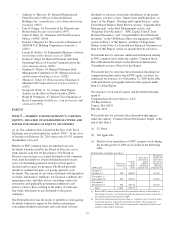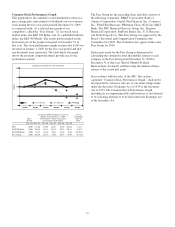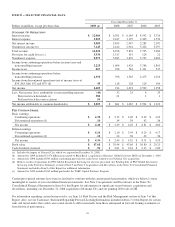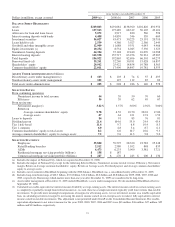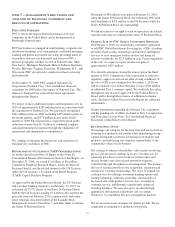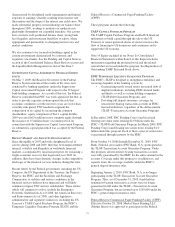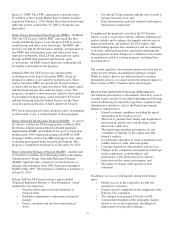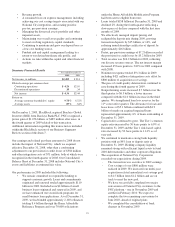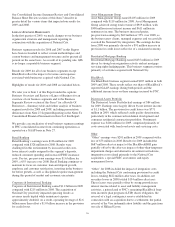PNC Bank 2009 Annual Report Download - page 20
Download and view the complete annual report
Please find page 20 of the 2009 PNC Bank annual report below. You can navigate through the pages in the report by either clicking on the pages listed below, or by using the keyword search tool below to find specific information within the annual report.Our asset valuation may include methodologies,
estimations and assumptions that are subject to differing
interpretations and could result in changes to asset
valuations that may materially adversely affect our results
of operations or financial condition.
We must use estimates, assumptions, and judgments when
financial assets and liabilities are measured and reported at
fair value. Assets and liabilities carried at fair value inherently
result in a higher degree of financial statement volatility. Fair
values and the information used to record valuation
adjustments for certain assets and liabilities are based on
quoted market prices and/or other observable inputs provided
by independent third-party sources, when available. When
such third-party information is not available, we estimate fair
value primarily by using cash flows and other financial
modeling techniques utilizing assumptions such as credit
quality, liquidity, interest rates and other relevant inputs.
Changes in underlying factors, assumptions, or estimates in
any of the areas underlying our estimates could materially
impact our future financial condition and results of operations.
During periods of market disruption, including periods of
significantly rising or high interest rates, rapidly widening
credit spreads or illiquidity, it may be more difficult to value
certain of our assets if trading becomes less frequent and/or
market data becomes less observable. There may be certain
asset classes that were in active markets with significant
observable data that become illiquid due to the current
financial environment. In such cases, certain asset valuations
may require more subjectivity and management judgment. As
such, valuations may include inputs and assumptions that are
less observable or require greater estimation. Further, rapidly
changing and unprecedented credit and equity market
conditions could materially impact the valuation of assets as
reported within our consolidated financial statements, and the
period-to-period changes in value could vary significantly.
Our business and financial results could be impacted
materially by adverse results in legal proceedings.
Many aspects of our business involve substantial risk of legal
liability. We have been named as defendants in various legal
proceedings arising from our business activities (and in some
cases from the activities of companies we have acquired). In
addition, we are regularly the subject of governmental
investigations and other forms of regulatory inquiry. The
results of these legal proceedings and governmental
investigations and inquiries could lead to significant monetary
damages or penalties, restrictions on the way in which we
conduct our business, or reputational harm.
Some of our customers could be adversely affected by
climate-related conditions which could have an impact on
our business.
Our business could be negatively impacted by adverse
changes in the creditworthiness of our customers and by
adverse changes in customer demand for our products and
services to the extent that our customers are negatively
impacted by climate-related physical changes and hazards or
by legislative and regulatory initiatives relating to climate
change or other conditions.
Our business and financial performance could be
adversely affected, directly or indirectly, by natural
disasters, by terrorist activities or by international
hostilities.
The impact of natural disasters, terrorist activities and
international hostilities cannot be predicted with respect to
severity or duration. However, any of these could impact us
directly (for example, by causing significant damage to our
facilities or preventing us from conducting our business in the
ordinary course), or could impact us indirectly through a
direct impact on our borrowers, depositors, other customers,
suppliers or other counterparties. We could also suffer adverse
consequences to the extent that natural disasters, terrorist
activities or international hostilities affect the economy and
capital and other financial markets generally. These types of
impacts could lead, for example, to an increase in
delinquencies, bankruptcies or defaults that could result in our
experiencing higher levels of nonperforming assets, net
charge-offs and provisions for credit losses.
Our ability to mitigate the adverse consequences of such
occurrences is in part dependent on the quality of our
resiliency planning, including our ability to anticipate the
nature of any such event that occurs. The adverse impact of
natural disasters or terrorist activities or international
hostilities also could be increased to the extent that there is a
lack of preparedness on the part of national or regional
emergency responders or on the part of other organizations
and businesses that we deal with, particularly those that we
depend upon.
ITEM
1
B
–
UNRESOLVED STAFF COMMENTS
There are no SEC staff comments regarding PNC’s periodic or
current reports under the Exchange Act that are pending
resolution.
ITEM
2–
PROPERTIES
Our executive and administrative offices are located at One
PNC Plaza, Pittsburgh, Pennsylvania. The thirty-story
structure is owned by PNC Bank, N.A.
We own or lease numerous other premises for use in
conducting business activities, including operations centers,
offices, and branch and other facilities. We consider the
facilities owned or occupied under lease by our subsidiaries to
be adequate. We include here by reference the additional
information regarding our properties in Note 11 Premises,
Equipment and Leasehold Improvements in the Notes To
Consolidated Financial Statements in Item 8 of this Report.
16


